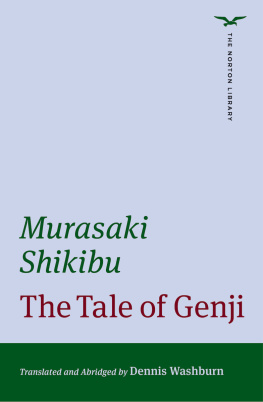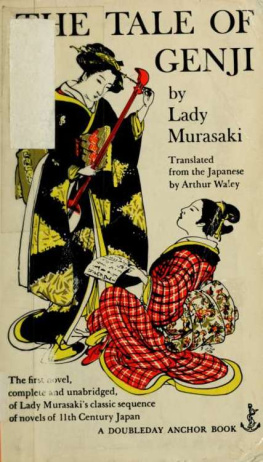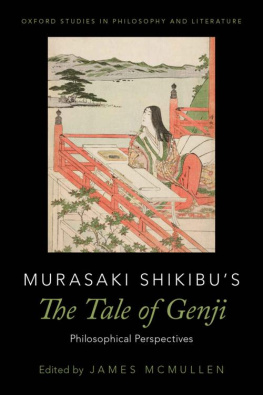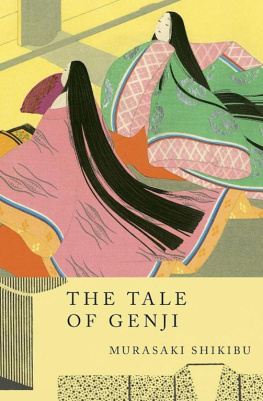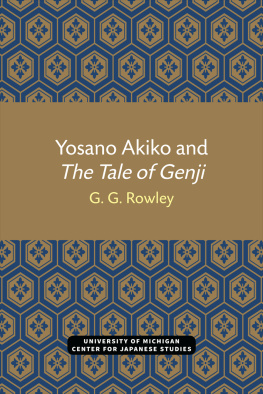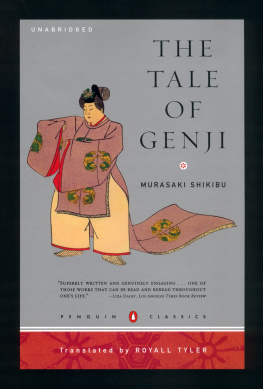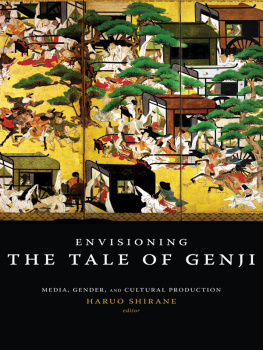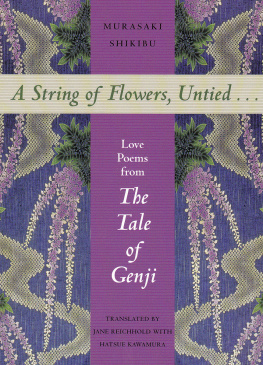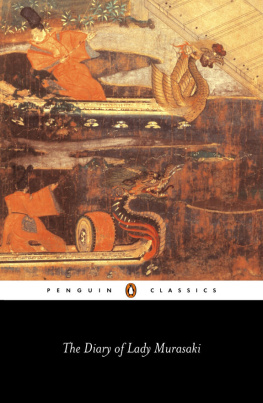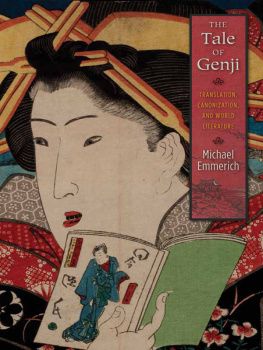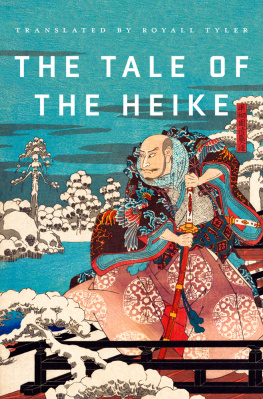Shikibu - The Tale of Genji (The Norton Library)
Here you can read online Shikibu - The Tale of Genji (The Norton Library) full text of the book (entire story) in english for free. Download pdf and epub, get meaning, cover and reviews about this ebook. year: 2021, publisher: W. W. Norton & Company, genre: Science fiction. Description of the work, (preface) as well as reviews are available. Best literature library LitArk.com created for fans of good reading and offers a wide selection of genres:
Romance novel
Science fiction
Adventure
Detective
Science
History
Home and family
Prose
Art
Politics
Computer
Non-fiction
Religion
Business
Children
Humor
Choose a favorite category and find really read worthwhile books. Enjoy immersion in the world of imagination, feel the emotions of the characters or learn something new for yourself, make an fascinating discovery.
The Tale of Genji (The Norton Library): summary, description and annotation
We offer to read an annotation, description, summary or preface (depends on what the author of the book "The Tale of Genji (The Norton Library)" wrote himself). If you haven't found the necessary information about the book — write in the comments, we will try to find it.
The Tale of Genji (The Norton Library) — read online for free the complete book (whole text) full work
Below is the text of the book, divided by pages. System saving the place of the last page read, allows you to conveniently read the book "The Tale of Genji (The Norton Library)" online for free, without having to search again every time where you left off. Put a bookmark, and you can go to the page where you finished reading at any time.
Font size:
Interval:
Bookmark:
In Dennis Washburns new translation of The Tale of Genji, lovers of novels will have the literary experience denied them until now.... Washburn eliminates the gap in centuries between us and that long-lost world and preserves for us the freshness of vision and voice of that great writer from long ago.
Alan Tansman, University of California, Berkeley
Washburn has performed a great service by making this groundbreaking novel, written in the eleventh century, available to the English-speaking world in a version worthy of the Japanese masterpiece.
Edith Grossman, translator of Don Quixote
Washburns translation is a very good one.... Waley is now a little old-fashioned. Washburns Genji is a fine intro for anyone wanting a way into this inviting, vibrant work.
Philadelphia Inquirer
Dennis Washburns lucid and accessible rendering will introduce new readers to the entrancing narrative world of this great classic.
David Lurie, Columbia University
An amazingly cheering performance, a Genji to last a century.
Open Letters Monthly
Please note that this version of the ebook does not include access to any media or print supplements that are sold packaged with the printed book.

DENNIS WASHBURN is the Burlington Northern Foundation Professor of Asian Studies in honor of Richard M. Bressler 52 at Dartmouth College. He holds a PhD from Yale University in Japanese language and literature. He lives in Hanover, New Hampshire.
Euripides, Medea
Translated by Sheila Murnaghan
Sophocles, Oedipus Tyrannos
Translated by Emily Wilson
Aristophanes, Lysistrata
Translated by Aaron Poochigian
Murasaki, The Tale of Genji
Translated and Abridged by Dennis Washburn
Locke, Second Treatise of Government
Edited by A. John Simmons
Rousseau, Discourse on the Origin of Inequality
Translated by Julia Conaway Bondanella and Edited by Frederick Neuhouser
Shelley, Frankenstein
Edited by Michael Brub
Mill, Utilitarianism
Edited by Katarzyna de Lazari-Radek and Peter Singer
Dostoevsky, Notes from Underground
Translated by Michael R. Katz
Woolf, Mrs. Dalloway
Edited by Merve Emre
For a complete list of titles in the Norton Library, visit wwnorton.com/norton-library
W. W. Norton & Company has been independent since its founding in 1923, when William Warder Norton and Mary D. Herter Norton first published lectures delivered at the Peoples Institute, the adult education division of New York Citys Cooper Union. The firm soon expanded its program beyond the Institute, publishing books by celebrated academics from America and abroad. By midcentury, the two major pillars of Nortons publishing programtrade books and college textswere firmly established. In the 1950s, the Norton family transferred control of the company to its employees, and todaywith a staff of five hundred and hundreds of trade, college, and professional titles published each yearW. W. Norton & Company stands as the largest and oldest publishing house owned wholly by its employees.
Copyright 2022, 2015 by Dennis Washburn
Copyright 2021 by W. W. Norton & Company, Inc.
All rights reserved
First Edition
Editor: Pete Simon
Associate Editor: Katie Pak
Editorial Assistant: Olivia Atmore
Project Editor: Maura Gaughan
Compositor: Westchester Publishing Services
Book designer: Marisa Nakasone
Production Manager: Jeremy Burton
Ebook Production Manager: Kate Barnes
Library of Congress Cataloging-in-Publication Data
Names: Murasaki Shikibu, 978? author. | Washburn, Dennis C. (Dennis Charles), 1954, translator.
Title: The tale of Genji / Murasaki Shikibu ; translated and abridged by Dennis Washburn.
Other titles: Genji monogatari. English
Description: First edition. | New York: W. W. Norton & Company, [2022] | Series: The Norton library | Includes bibliographical references.
Identifiers: LCCN 2021012967 | ISBN 9780393427912 (paperback) | ISBN 9780393885392 (epub)
Subjects: LCSH: Murasaki Shikibu, 978? Translations into English. | Courts and courtiersJapanFiction. | Japanese fictionTo 1600Translations into English. | Murasaki Shikibu, 978? Genji monogatari.
Classification: LCC PL788.4.G4 E5 2022 | DDC 895.63/14dc23
LC record available at https://lccn.loc.gov/2021012967
ISBN: 978-0-393-42791-2 (pbk.)
ISBN: 978-0-393-88539-2 (ebook)
W. W. Norton & Company, Inc., 500 Fifth Avenue, New York, N.Y. 10110
www.wwnorton.com
W. W. Norton & Company Ltd., 15 Carlisle Street, London W1D 3BS
Ebook version: 1.1-retailer
Chapters marked with an asterisk are omitted in this Norton Library abridgment. Each is substituted in place with a short summary of the intervening plot.
What makes a literary work a classic?
At first glance the answer to this question seems straightforward, since most readers can, when asked, readily produce a list of canonical works, ancient or modern, that reflects both personal preferences and the commonly accepted standards of their particular culture. However, when reading and judging works from markedly different literary traditions, responding to this question becomes more challenging. This is certainly the case with The Tale of Genji, which has been considered a classic in Japan for almost a millennium. The work is a complex prose narrative that has rhetorical features strikingly similar to the modern novel even though it depicts a society whose values and cultural assumptions contemporary readers (including Japanese readers) may find difficult to relate to or comprehend. How, then, are we to judge The Tale of Genji? Are there standards that can be usefully applied across time and cultural differences?
Taking account of both the intrinsic literary qualities and the reception histories of literary works that are now deemed classics, it is clear that The Tale of Genji shares with them at minimum the following five characteristics. They emerge out of an established tradition, which they in turn fundamentally transform. Their formal artistry is of a depth and complexity that demands and rewards re-reading over the lifetime of an individual, while inspiring different interpretations over generations. They serve as a model for other artists across different media. They are paradoxically both worldly and intensely provincial. Finally, and above all, they are powerfully seductive. Examining The Tale of Genji through the critical lens of these characteristics will, I believe, illuminate the source of its achievement and its legacy.
When Murasaki Shikibu began her masterwork at the beginning of the eleventh century, she was already well versed in the literary practices that were an integral part of the everyday life of the court aristocracy during the Heian period (7941185). Murasaki was born into a lower-ranking branch of the politically dominant Fujiwara clan. Her father, Fujiwara no Tametoki (ca. 945?), was an accomplished poet and scholar of Chinese, and a number of her ancestors were also highly regarded poets: most notably her great-grandfather, Fujiwara no Kanesuke (877933), her grandfather, Masatada (d. 962), and her uncle, Tameyori (d. ca. 998), all of whom had poems selected for inclusion in various prestigious, imperially sponsored anthologies. Yet despite this literary lineage, Tametoki never occupied any position of political significance, and that lack of high official status posed challenges for his daughter throughout her life.
Font size:
Interval:
Bookmark:
Similar books «The Tale of Genji (The Norton Library)»
Look at similar books to The Tale of Genji (The Norton Library). We have selected literature similar in name and meaning in the hope of providing readers with more options to find new, interesting, not yet read works.
Discussion, reviews of the book The Tale of Genji (The Norton Library) and just readers' own opinions. Leave your comments, write what you think about the work, its meaning or the main characters. Specify what exactly you liked and what you didn't like, and why you think so.

